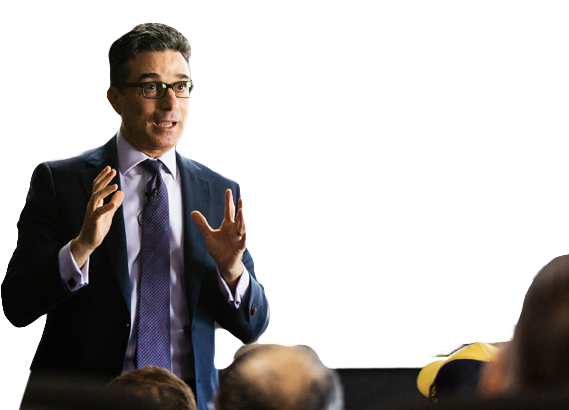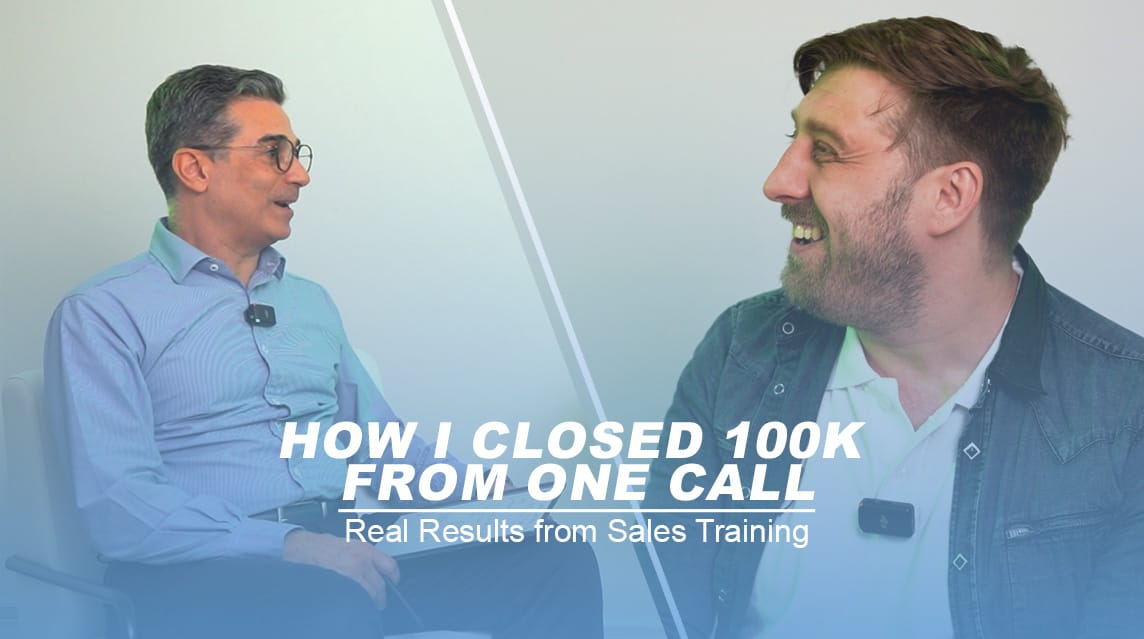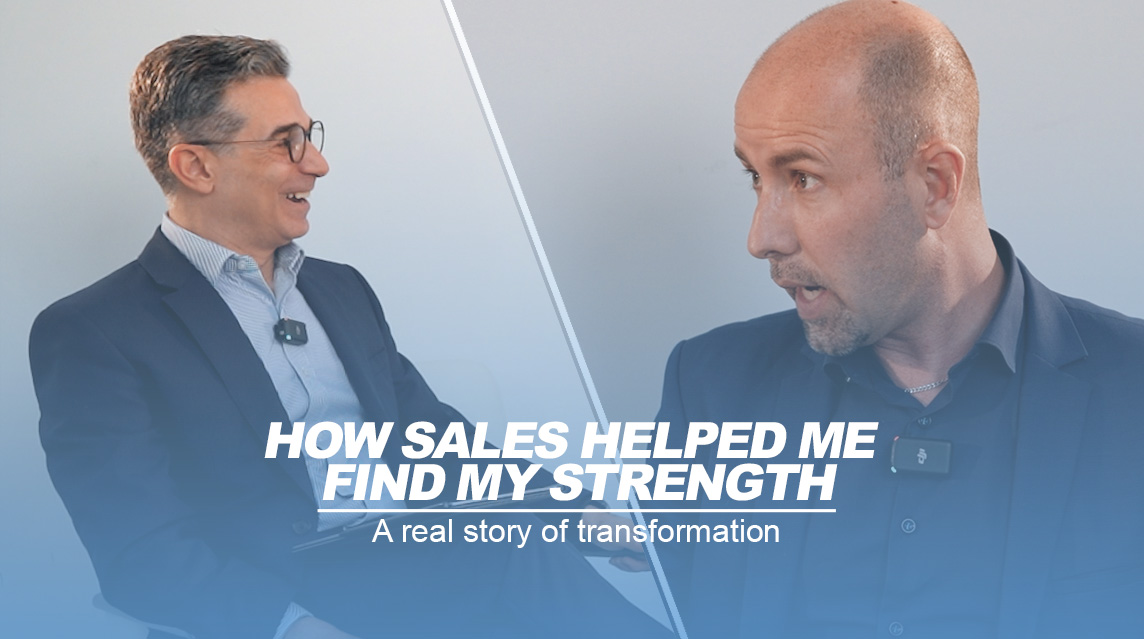Want to receive more great sales strategies directly in your inbox? Complete the form below to receive future content by email
Sales Professor Ramez Helou
CEO and Founder of The Academy for Sales Excellence
Brian how are you doing?
Brian Tracy
Chairman and CEO of Brian Tracy International
I’m doing great.
Sales Professor Ramez Helou
It’s great to see you again and what a wonderful event we had today; having you in Dubai, UAE is always a pleasure.
Brian as you know, I run The Academy for Sales Excellence where I train company sales representatives to go out there and sell more.
I also work with sales leadership teams to ensure that they are driving business results and there are a few questions that we would like to get your take on.
Today, competition is fierce, and everybody wants to come to the Middle East when Europe and North America aren’t growing at previous rates.
As a result, competition is increasing compared to previous years; what would be some tips or ideas that you feel will help business owners and sales professionals to differentiate themselves, maintain their profit margins, and avoid falling into the commoditization trap moving forward?
Brian Tracy
The first part of differentiation is to decide where your product or service is superior to that of your competitors and it has to be superior in a meaningful way so that customers will buy your product.
80% of businesses according to recent surveys do not know why their customers buy their product rather than some other product. They think it may be many reasons but they’re not really sure of the correct reason.
So, the starting point is why is my product or service better, because as they say, if you do not have competitive advantage you should not compete.
And sometimes your competitive advantage could be the quality of the product; it tastes better for example.
Usually, the very best competitive advantage could be the pricing structure, or it could be the ingredients, but when you’re selling products through third party sales people like food
products for example, the advantage that you can develop is the speed of delivery and the accuracy of accounting so that people can always depend upon you to be sure that you have
the right number of the right selling products on the shelves at the right time.
The best example of this is Walmart
They have the most sophisticated distribution system in the world.
They use satellites so that they never have a single incidence where its company stores run out of a stock.
If there is a 42 centimeter blue long sleeve business shirt that is sold in this store anywhere in the world, each time that is sold, it goes to the satellite which goes to the factory which then produces a new one which is then distributed so that it all arrives so that they have never have over stock or under stock as a result.
Walmart can charge low prices and pass the savings on to their customers because of their distribution skill so that’s an area where you can differentiate where you have a much better distribution
There’s nothing that makes the ultimate seller of your product angrier than to have a customer
and have no stock, so if your product cannot be differentiated because it is not substantially different from your competition, then you can differentiate it only by the way price, and or the way that you deliver.
Sales Professor Ramez Helou
You know the thing that comes up now as suppliers and as distribution companies are that we go to put in systems and especially in a b2b context selling to other businesses where there is a buying function [procurement].
And as much as one of the decision makers who the sales rep might be interacting with, the deal goes back to buying the buying function [procurement] where they try to devalue or erase all supplier differentiation to make your product look like everything else.
This is especially so in this part of the world [Middle East].
People here like to negotiate and to haggle.
Any tips on how to avoid that trap and how to possibly overcome someone that engages with you with such tactics?
Brian Tracy
Well this is common all over the world.
Psychologically, people have a great fear of more pain than is necessary.
It’s not the price; it’s the thought that they could get it at a lower price if they ask or if they negotiate; so they have to realize that this price is fixed and that it’s inflexible.
For example, I have a Rolex watch.
When I went to buy this watch, I found that Rolex has price uniformity worldwide.
If I buy this watch in any country, China, US, Dubai, Switzerland, it’s exactly the same
price; you cannot get it cheaper somewhere else, so if you want a Rolex
watch, that is the price you pay.
There are no discounts and it’s the same.
If you have your price schedule, the prices should be fixed.
The only deviation is if the customer buys more, so that’s how you negotiate, you say this
is the price but if you buy a larger quantity or commit to a larger quantity which saves us time and money in production and distribution, then we will pass on the savings to you.
You see. if I say to you my product costs 100 dinars or 100 euro, and you say well can I get it
lower; can I get a lower price and you say well maybe we could go down to 90, well then what you’re saying is the first price I was trying to cheat you.
So I’m basically here to cheat you and as much as possible and then you say well what if I buy what if what are your other customers paying?
Well you know some of our other customers only pay 80, so it’s a double cheat.
Now, I can’t trust you because I’m afraid that whatever price I pay you, that I could have gotten it for a lower price if I was just adamant; so therefore, I’m not going to make a decision today.
I think about when I bought my first computer from IBM
I actually had to buy two or three computers for my business.
So, I asked them how much is a computer and they said $3,500.
I said what if I buy two? The salesman said that’s very simple; you multiply two times three thousand five hundred.
And, what if I buy ten? Well, then you just multiply ten and there isn’t any discount.
Well what are the terms? Cash, but what about financing? IBM said that they’re not a bank, so if you want to finance the purchase of computers, that I must go to my own bank and borrow the money.
We [IBM] sell for a fixed price for cash in advance and then you get the product and so everyone in the world knew that IBM prices were fixed and not flexible.
You had to pay a hundred percent in advance to get an IBM product and that was the end of it.
Everybody in the world knew that everyone else in the world was paying exactly the same price on the same terms and conditions; it’s only when your prices are different for different people that you’re always negotiating and you’re always losing the deal because if I think that I’m paying too much I will just delay.
I would say well let me think about it or write me a proposal or give me some information.
So be clear about your prices but be willing to reduce the price for volume purchases.
Sales Professor Ramez Helou
Great point.
You know having worked with lots of organizations, the number one thing that everyone is after is more sales.
And, in some occasions, it’s at the expense of learning how to get more sales; so it’s going out there doing the same old same old and expecting a different result.
And, I understand in many distribution organizations serving their customers, answering the phone, or submitting a proposal and ensuring ordering stocks etc is key activities.
So any tips for sales representatives working within organizations where they might be a bit overworked in terms of how they can sharpen the saw in order to really get better results?
Brian Tracy
Well, one of the reasons why they’re overworked is because they waste so much time in non-work activities as we talked about in our seminars.
They spent a lot of time talking to their co-workers and they spent time playing games on the computer and going on to Facebook and reading the newspaper and so on.
So basically what we teach is to make a list of everything you need to do each day and
then follow your list every day and when you work, you work all the time.
You work, don’t waste time; just keep moving steadily through your work and you’ll be amazed at how much you get your time under control and how much you accomplish in a day.
In every organization where there’s several people working internally there’s always one who is the most productive.
This person produces more than anybody else because they’re working all the time and the others are talking or doing something else.
So, it comes back to setting priorities, working all the time you work, working on your most important tasks and completing each of those tasks as you go along.
Sales Professor Ramez Helou
This is great.
You know the next thought that’s coming to mind is that many times sales professionals know what they need to do.
How do we bridge the gap Brian going from what you know what to do, but then they get caught up in other activities – do you have any tips or ideas?
Brian Tracy
Human beings are motivated by rewards or punishment.
I worked with a company that was in serious financial trouble and then they brought in a new president and the president turned the company around from USD 1 Billion in losses to USD 1 Billion in profits in one year.
And then, they had a big celebration for the company and I was invited to be the speaker so I sat next to the president and I asked how did you bring about such a big change because it had been in all the newspapers, magazines etc.
This man was considered to be one of the genius executives because he had turned this business around.
He said it was very simple; he said I came in and we had low sales as our sales were too long.
The company had 32 branches in the state of California; so I asked why are sales too low? Our salespeople are not making enough sales.
So he investigated and he found that the average sales person was making two new customer calls per week.
Even though the company generated leads, it had a big reputation and it had a large base of previous customers.
They were only making 2 calls a week.
So, he said what is this? And he said well, because there’s no requirements, no standards, so people come to the office and they spend most of their time in the office and maybe twice a week on average.
So, he called his vice-president of marketing and sales and he said effective next month, first of the month, I want every salesperson making 2 calls per day with her sales report at the end of the day showing who they called on and what they spoke about and what is the likelihood of a
Sale.
And, so he called all the managers and sales managers and as the president said if you are not making two calls each day by the end of the month you will be fired and I’ll replace you with someone else.
Like a general in the middle of an army at a battle, he called the sales managers and he said that I want every one of your salespeople making two calls every day or you’ll be fired and so they called all their salespeople together and said we’ve just got instructions from headquarters; every person here will be making a minimum of two calls per day on new customers or they’ll be fired and the company turned around and you had to do a report and the sales manager had to make a report and send it up.
Everybody was motivated because other than that they would be fired and they had very good base salaries and so on.
So, it’s the same sort of thing why people are not active enough; it’s because they don’t have standards and the sales manager does not impose measures and deadlines for every activity.
I knew one company that transformed by saying from now on, you will make 10 calls.
10 calls on new customers and you will speak to 10 new prospective customers and put it in a report every day.
I took over a company once and I used this method and I said every salesman will be making five calls every day effective tomorrow.
If you don’t make five calls each day with reports then you will be fired and I had something like 25 salespeople within one week 10 had left.
They just quit because they weren’t willing to work.
The other 15 transformed the business.
It became one of the most successful businesses in the industry; people said well you must be a miracle worker.
No, you just have very set clear standards and you enforce the standards.
Sales Professor Ramez Helou
Great thanks for sharing them Brian.
I have attended many of your seminars and highly recommend individuals to keep learning
from the wealth of knowledge and experience that you bring to the table.



